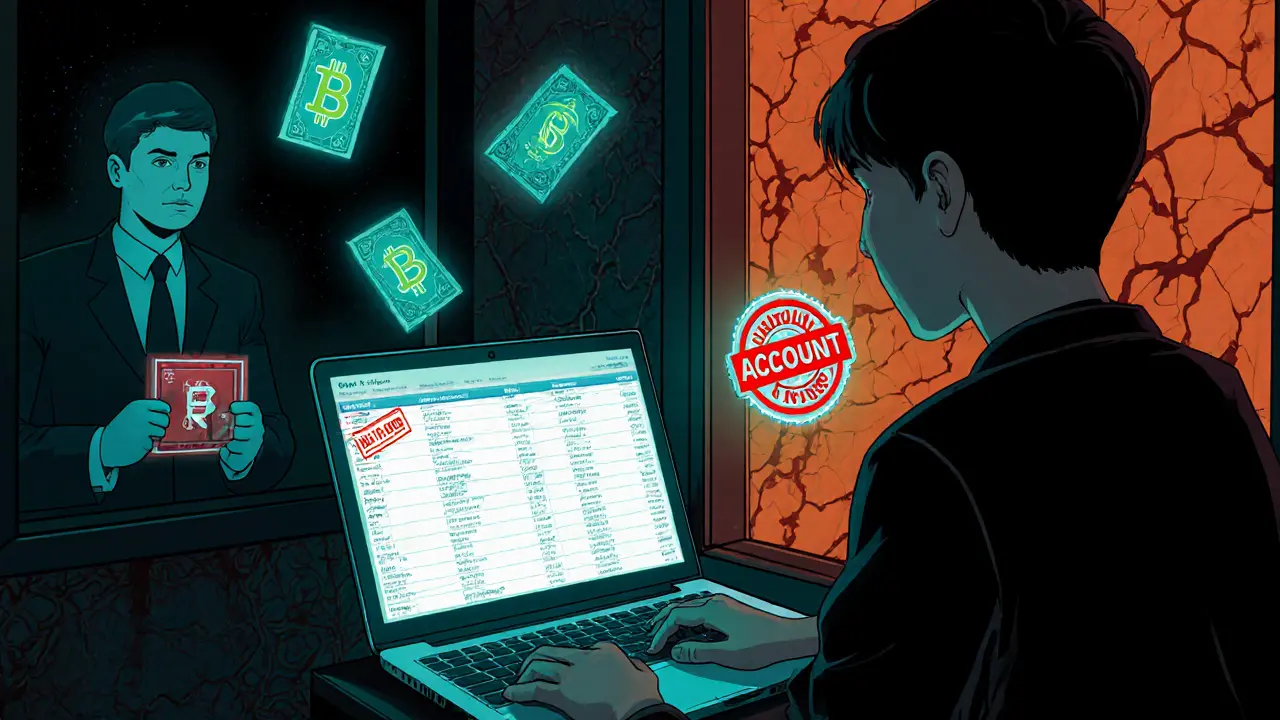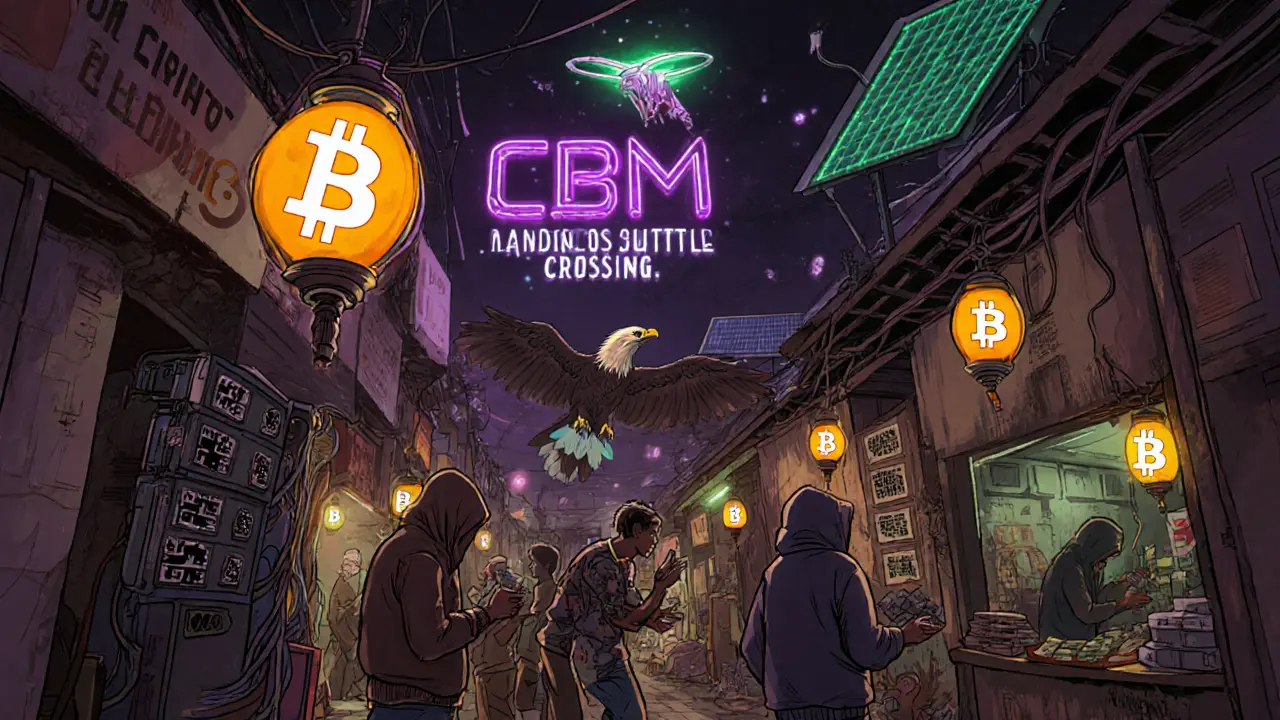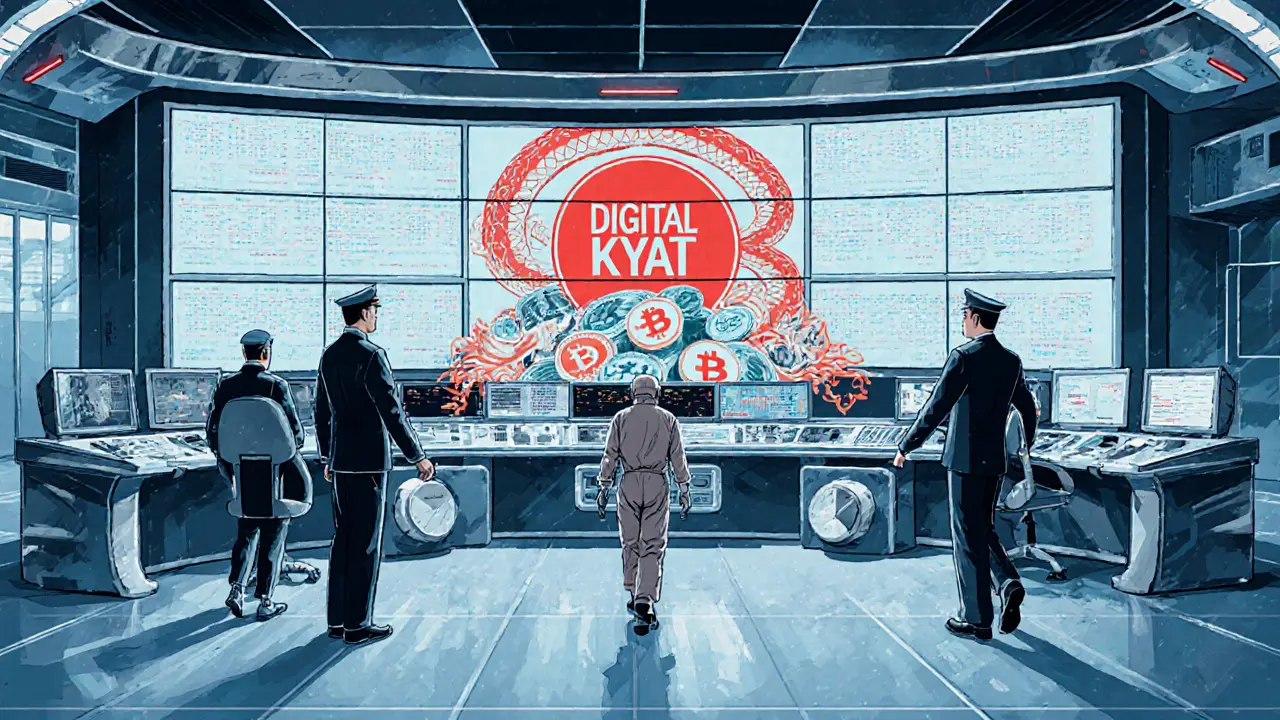Account Closure Penalties for Crypto in Myanmar: What Happens If You Trade Bitcoin or USDT
 Nov, 14 2025
Nov, 14 2025
Myanmar Crypto Risk Calculator
This tool estimates your risk level based on your crypto activities in Myanmar. Note that all cryptocurrency usage carries legal risk in Myanmar. The Central Bank of Myanmar has explicitly banned all crypto transactions.
Your Crypto Activities
If you’re using Bitcoin, Ethereum, or USDT in Myanmar, you’re playing with fire-and the fire is real. Your bank account can vanish overnight. Not just frozen. Not just flagged. Closed. And that’s only the beginning.
Why Myanmar Bans Crypto Completely
Myanmar’s central bank, the CBM, doesn’t just dislike cryptocurrency. It treats it as a threat to national financial stability. Since 2020, the bank has declared all digital currency transactions illegal. That includes buying, selling, mining, trading, or even sending crypto through Facebook, Telegram, or offshore exchanges. The law is clear: only the Central Bank of Myanmar can issue currency. Anything else? Illegal. The crackdown isn’t random. It’s tied to deeper problems: a collapsing kyat, capital controls after the 2021 coup, and widespread distrust in the official banking system. Many citizens turned to crypto to send money abroad, save value, or fund resistance efforts. But the military-backed government saw this as a loss of control. So they responded with force.Account Closure Is the First Strike
The most common penalty? Immediate bank account closure. No warning. No grace period. Just a notice from your bank: your account is shut. Funds may be frozen. You can’t withdraw. You can’t transfer. You can’t even reopen the account without legal clearance-which is nearly impossible. This isn’t theoretical. In May 2024, the CBM publicly announced it was actively closing accounts linked to crypto transactions. They didn’t just threaten-they followed through. People who used crypto to pay for goods, send remittances, or trade on peer-to-peer platforms suddenly found their life savings locked out. Some lost access to their business accounts. Others lost their personal savings accounts used to support family members overseas. The CBM targets specific behaviors: transferring crypto through personal social media pages, using Facebook groups to coordinate trades, or receiving USDT on Tron network wallets tied to local bank accounts. Even if you didn’t buy crypto yourself, just helping someone else convert it to kyat can get your account shut down.It Gets Worse: Fines and Jail Time
Account closure is just the first step. Under Myanmar’s Anti-Money Laundering Law and Financial Institutions Law, you can also face criminal charges. Fines can reach millions of kyat-far more than most people earn in a year. And jail? That’s real too. In 2024, multiple individuals were prosecuted for crypto-related transactions. Some were held for weeks without formal charges. Others received prison sentences of up to two years. The charges? Illegal currency conversion, operating an unlicensed financial service, and violating the Central Bank of Myanmar Law. The CBM doesn’t just go after big traders. They’ve gone after students, small shop owners, and even farmers who accepted USDT for crops sold to traders. If your bank account is linked to a crypto transaction-even once-it’s enough to trigger an investigation.What Cryptocurrencies Are Targeted?
It’s not just Bitcoin. The CBM has named specific coins in its enforcement notices:- Bitcoin (BTC)
- Ethereum (ETH)
- Litecoin (LTC)
- Perfect Money (PM)
- Tether (USDT)-especially on the Tron network

Underground Crypto Is Still Alive (But Riskier Than Ever)
Despite the risks, crypto hasn’t disappeared. It’s gone deeper underground. In 2025, peer-to-peer trading on Telegram exploded. People meet in encrypted groups to swap kyat for USDT. Some use cash handoffs in markets. Others use intermediaries who move money through multiple accounts to hide the trail. But each step increases the risk. One slip-up-wrong contact, leaked screenshot, bank report-and you’re in trouble. There’s also a rise in hidden mining operations. People run rigs in back rooms, basements, or remote villages, using solar power to avoid detection. But power companies report unusual spikes in usage. Neighbors talk. Authorities raid homes. Miners have been arrested for running equipment without permits. The irony? The National Unity Government (NUG), which controls parts of the country, declared USDT legal tender in 2021. So in some areas, crypto is a tool of resistance. In others, it’s a crime. You can be arrested for doing the same thing in different parts of the country.Myanmar Is Building Its Own Digital Currency
While banning all other crypto, the CBM is quietly building its own digital currency: the digital kyat. In June 2025, the Central Committee for the Issuance of Central Bank Digital Currency was formed. Chaired by the CBM Governor, it includes top officials from finance, defense, and technology. Their goal? Launch a state-controlled digital currency by 2027. This isn’t about innovation. It’s about control. The government wants to track every transaction, freeze accounts remotely, and cut off dissenters from the financial system. The digital kyat won’t be decentralized. It won’t be anonymous. It will be the opposite of Bitcoin. So while you’re risking jail for using USDT, the state is preparing to force you into a system where every payment is monitored, recorded, and controlled.Who’s Most at Risk?
You’re not safe if you:- Use crypto to send money to family overseas
- Accept crypto as payment for goods or services
- Trade on Telegram or local Facebook groups
- Use a crypto exchange that doesn’t require KYC
- Help someone convert crypto to kyat
- Have a bank account that received even one crypto-related deposit

What Happens If Your Account Gets Closed?
Once your account is closed:- You can’t access any funds until the CBM reviews your case
- You may be summoned for questioning by financial police
- You could be required to sign a confession
- You might be fined or face criminal charges
- You may be barred from opening another bank account for years
Is There Any Way to Stay Safe?
No. Not really. If you’re in Myanmar and you want to avoid penalties, the only guaranteed way is to avoid crypto entirely. No trading. No holding. No sending. No receiving. Some people try to use cash or hundi (informal money transfer systems), but those are also monitored. Others move abroad-Thailand, Laos, or Malaysia-where crypto is legal and banking is stable. That’s what many miners did in 2024. They packed up their rigs and left. For those who can’t leave, the choice is brutal: live under financial control, or risk losing everything.What’s Next for Crypto in Myanmar?
The crackdown isn’t slowing down. In fact, it’s getting worse. The CBM is working with telecom companies to block access to crypto-related websites and apps. Banks are installing AI tools to flag crypto-related transfers. Law enforcement is training officers to track digital wallets linked to local IDs. By 2026, the digital kyat will likely be rolled out in phases. Once it’s live, using any other crypto will be even riskier. The state will have full control over money flow. Dissenters will be cut off. The underground economy will face even harsher penalties. Myanmar is becoming one of the most hostile places on Earth for cryptocurrency. Not because it’s unstable. But because it’s being tightly controlled. If you’re thinking about using crypto here, ask yourself: Is a few hundred dollars in USDT worth losing your bank account, your savings, your freedom? The answer, for most, is no.Can I get my bank account back after it’s closed for crypto use?
No. Once the Central Bank of Myanmar orders an account closed for crypto activity, there is no formal appeal process. Banks follow direct orders and do not restore accounts, even if you claim you didn’t know the rules. Your only option is to open a new account under a different name-which is risky and often impossible due to strict KYC rules.
Is using USDT on Telegram illegal in Myanmar?
Yes. The CBM has explicitly named USDT as a prohibited digital asset. Trading, sending, or receiving USDT through Telegram, Facebook, or any platform is illegal. Even if you’re just acting as a middleman, you can be charged with illegal currency conversion. Thousands of accounts have been closed for this reason since 2024.
Can I mine Bitcoin in Myanmar without getting caught?
It’s possible, but extremely dangerous. Mining rigs use high electricity, which triggers alerts from power companies. Neighbors may report suspicious activity. Authorities have raided homes and businesses for hidden mining operations. Those caught face fines, equipment seizure, and possible jail time under the Financial Institutions Law.
Does the National Unity Government (NUG) allow crypto?
Yes. The NUG declared USDT legal tender in 2021 in areas it controls to bypass junta currency controls. But this creates a dangerous legal gray zone. If you’re in a region controlled by the military government, using USDT-even if you’re in an NUG area-is still illegal under CBM law. Crossing lines can lead to arrest.
Will the digital kyat replace cash in Myanmar?
The CBM plans to roll out the digital kyat in phases starting in 2026. It will likely replace cash in urban areas first, especially for government payments and large transactions. Rural areas may still use cash, but the goal is full digital control. Unlike Bitcoin, the digital kyat will be fully tracked, frozen, and monitored by the state.
What happens if I send crypto to someone in Myanmar?
If the recipient cashes it out through a local bank, their account will likely be closed. Even if they don’t withdraw it, the mere receipt of crypto into a local wallet linked to a Myanmar bank account can trigger a CBM investigation. Senders outside Myanmar aren’t prosecuted, but recipients face severe penalties.
Are crypto exchanges banned in Myanmar?
Yes. All crypto exchanges operating within Myanmar are illegal. Even if they claim to be “non-custodial” or “peer-to-peer,” they’re still violating the Financial Institutions Law. The CBM has blocked access to dozens of exchanges and pressured local ISPs to cut off traffic to crypto sites.
Can I use crypto to pay for goods in Myanmar?
Technically, no. Accepting crypto as payment is considered illegal currency exchange under CBM rules. Even if you and the buyer agree, the transaction can be traced through bank records or digital wallet links. Merchants who do this risk account closure, fines, and criminal charges.